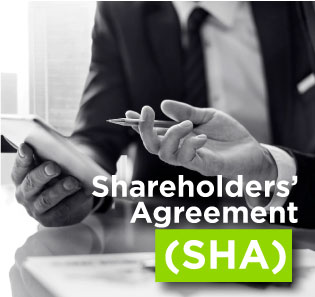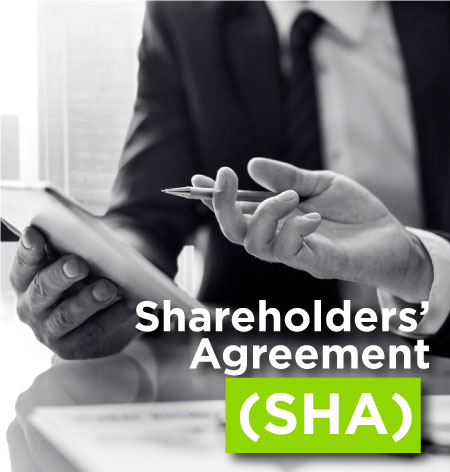Introduction
Small & Medium-sized companies are generally family-owned, with shareholders being family members. In such cases, the need for a Shareholders’ Agreement is never felt. However, companies co-founded by individuals who may be unrelated and from diverse backgrounds or companies having more than one shareholder group who are not involved in the day-to-day functioning or companies funded by investors are ordinarily advised to have a Shareholders’ Agreement. The founding shareholders or owners should consider entering into such an agreement to create a contractual basis to govern the relationship among themselves and between the incoming shareholders and the company in terms of the rights and obligations of each of them in business operations. A Shareholders’ Agreement is not mandated or regulated by law, so the question arises as to why one should invest time and effort in having a well-drafted Shareholders’ Agreement. A Shareholders’ Agreement can ensure the following:- a framework for shareholders to work together
- the business is well operated
- clear communication channels among shareholders and
- boost in the value of your business if you are seeking investment or sale.
- However, before we delve deeper into why a Shareholders’ Agreement is crucial for a successful business, let’s understand what it means.
What is a Shareholders’ Agreement?
As the name suggests, Shareholders’ Agreement (Hereinafter SHA) is an agreement between all or a particular class of company shareholders. It stipulates the below mentioned:- rights, responsibilities, privileges, and protection of shareholders
- explicitly defines the relationship between the shareholders of the company and the company as an entity.
- Think of an SHA as a rule book or guideline which outlines the internal management framework of the company to safeguard the shareholders’ interests and investments.
Types of Shareholders’ Agreements based on the company’s corporate lifecycle
Companies may go through different stages during their lifecycle, as in the Seed stage, Early stage and Growth Stage. Depending on the stage of business and the scale of business operations, the clauses of SHA also change. You may also need to rewrite or modify your original agreement, as each stage of business growth has distinct requirements.:
Seed stage
The seed stage SHA should outline each shareholder’s equity stakes, contributions, roles, and responsibilities. This agreement should also specify how much time and effort the shareholders are expected to dedicate to the company and determine the vesting cycle.
Early stage
While an early-stage agreement has similar goals to that of a seed-stage, it can also regulate the modus operandi for new investors joining the company. This may require an existing SHA to be modified further to define the rights and responsibilities of the parties.
Growth stage
By this time, companies would have validated their business model and found a market niche. They may be looking for cash infusion by bringing in external investors. The SHA at this stage would be quite crucial, and it would be the opportune moment to implement an SHA after negotiating terms with the investors.

Why is Shareholders’ Agreement essential for your business?
After understanding the importance of SHAs, it’s pertinent for you to know how a well-drafted Shareholders Agreement can considerably impact your company’s operations. It helps to ensure that the SHA has the necessary clauses and provisions designed to protect the interest of all stakeholders. Not only can it help minimize the risk of disputes and disagreements, but it can also help ensure the company’s success by regulating the relationship between the shareholders. Given below are some of the reasons why a robust SHA is essential for a successful business:
1. Dispute resolution process
Disputes between shareholders are a common scenario. If a dispute arises among the parties, a well-written SHA can provide a mechanism for dispute resolution to set a clear path for resolving disputes swiftly to protect the company’s business. There can be specific clauses which provide for the stage at which there would be a referral to arbitration, the appointment of arbitrators, procedure, and rules for arbitration, among others.
2. Deadlock provisions
When certain matters require the consent of two or more parties and approval is not forthcoming, such inaction may adversely affect the company’s business. An SHA can minimize this risk by setting out deadlock provisions which set out the mechanics of how the deadlock will be resolved, including a clause where the parties can buy each other out.
3. Minority shareholders protection
An SHA can offer protection to minority shareholders by reserving certain decisions for the unanimous consent of all shareholders, for instance, amending the articles of association. Similarly, the agreement can contain “tag-along” provisions regarding the sale of shares by majority shareholders, in which case the buyer would be obligated to offer to buy the minority shareholders’ shares on the same (or better) terms.
4. Majority shareholders protection
An investor’s commercial intent would be to exit from the company at a price whereby they realise value for their investment. “Drag-along” provisions would come into the picture, where an offer is received to buy 100% of the shares in the company, and the majority shareholders seek to accept that offer. In those circumstances, the majority shareholders can “drag along” the minority shareholders to sell their shares to that third party on the same terms. This provision thereby guarantees an exit route to the majority shareholders.
5. Control on the transfer of shares
To minimize the risk in situations where a shareholder may decide to sell or transfer his shares to an unknown party which may lead to uncertainty in business operations, an SHA can provide for clauses which give the other shareholders a “right of first refusal” over those shares. This can enable the investors to acquire shares of the selling shareholders at an agreed price.
6. Non-compete clause
An SHA can impose restrictive covenants on the shareholders, which prohibits them from carrying on any other business that competes with the company’s business or soliciting customers, suppliers, or employees. These restrictions play a vital role in protecting the interests of the company.
7. Confidentiality
Having access to proprietary information created, developed, discovered, and having a commercial value in the business, the shareholders must maintain the confidentiality of the same. An SHA contains confidentiality provisions that enable the company to safeguard the valuable information that is key to its business, both whilst the agreement is in force and following its termination.
8. Management of the company
The parties to an SHA usually have the right to appoint either themselves or nominate someone else to act as a director on their behalf. The SHA contains detailed provisions regarding the company’s management at the director level, which provides clarity and consistency regarding the day-to-day running of the company’s business.
9. Investor rights
An SHA contains specific clauses which enable the investors to safeguard their investment and provide certain rights to them. These include board representation, affirmative voting rights for certain reserved matters, receipt of financial reports, budgeting plans, and the right to inspection.
10. Demonstrates business maturity and stability
Last but not least, a well-written SHA indicates that the business is well-structured, mature, stable, credible, and considerate of its shareholders. This becomes extremely important when the company is looking for potential investors.
Conclusion-Convinced that implementing an SHA is crucial for your business?
A shareholders’ agreement has great value in the smooth operation of both a large and a small company. During the company’s operation, the shareholders can amend the shareholders’ agreement to be sure it remains consistent with the shareholders’ goals.
If you’re looking for assistance in drafting a well-drafted SHA that will support your business in the proper manner, then get in touch with SimplyBiz for drafting a tailor-made agreement that holds up to your needs.
Our product SimplyTransact is just meant for you. Please reach out to our Product Head
– Ms. Shilpa Agarwal at the mail ID shilpa@simplybiz.in or SimplyTransact@simplyBiz.in to know more.
This Article has been authored by Ms. Sharanya Ramakrishnan from our SimplyTransact Team.


One Reply to “Why is Shareholders’ Agreement (SHA) crucial to a successful business?”
Well written article in simple n crisp language.
SHA is often mandated by the Investor